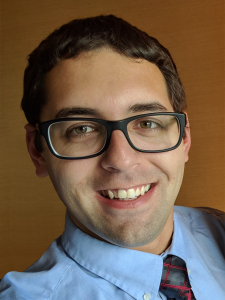 View my CV
View my CV
Kevin Pedro
Fermi National Accelerator Laboratory
Statement
I first arrived at Fermilab as an undergraduate summer intern (through the University of Rochester REU program) in 2010. I visited Fermilab frequently as a graduate student at the University of Maryland, living in the village for some time. After completing a postdoc with the Fermilab CMS group, I was promoted to Associate Scientist in the Scientific Computing Division (soon to be the Computational Science and AI Directorate), where I continue to work on CMS as well as other experiments like protoDUNE that need cutting-edge computing and machine learning. In the past, I’ve worked on other experiments such as the Daya Bay Reactor Neutrino Experiment and the CLIC test facility at CERN. Throughout the years, I have seen the different sides of Fermilab: I’ve experienced the lab as a student, postdoc, scientist, user, and employee, and I’m familiar with various facets of the lab’s scientific mission (computational, collider, neutrino, and accelerator physics). I find it to be a great place to work. Through the UEC, I want to address problems, make changes transparent and comfortable for everyone, and continue to make the lab even better.
I’m known at the lab as an advocate for both users and employees. I was part of the Computing Division Focus Group, which followed up on issues that were identified in the lab’s 2019 Climate Survey of all employees. We made recommendations about transparency in lab announcements (e.g. emailing all-hands announcements to users as well as employees), measures that could be taken to support our lab’s diverse population (e.g. supporting dietary restrictions at on-site food venues), and ways to reduce and minimize negative interactions in our community (e.g. making sure users know how to report harassment or other conduct violations). The UEC plays a crucial role in ensuring these and other improvements are implemented and meet the needs of everyone at the lab. In addition, the COVID-19 pandemic has permanently changed our workplaces, and even as in-person activities resume, remote and hybrid meetings will continue to play an even more important role. The UEC can make sure that it’s easy to follow best practices and advocate for accessibility so that the lab continues to be welcoming to everyone.
It’s also vital that we can continue to lead the field of particle physics with the research conducted at Fermilab and using the lab’s facilities. One part of that is minimizing bias and barriers so that anyone and everyone can participate. I’ve taken various roles in Fermilab’s high school and undergraduate internship programs, helped pioneer more inclusive hiring practices, and assisted, developed, and led courses at the lab including Saturday Morning Physics, the CMS Data Analysis School and Hands-on Advanced Tutorial Sessions, and the C++ class. Another part is ensuring robust federal funding for basic science. I have been involved with the annual “DC trip”, where the UEC and others provide information to Congress about our research and why it’s worthwhile, since 2016. I usually meet with at least a dozen Congressional offices, as well as executive branch offices. As we hope to resume in-person trips to DC after several years of virtual meetings, we must broaden our recruiting of participants in order to gather as much Congressional support as feasible. We will also approach another transition period when the new P5 report is released, building on the now-concluding Snowmass process. I made major contributions to the government outreach group in Snowmass, as well as co-convening the Computational Frontier topical area on theoretical calculations and simulation. With a strong and unified message, we can achieve a bright and equitable future for Fermilab and high energy physics.


